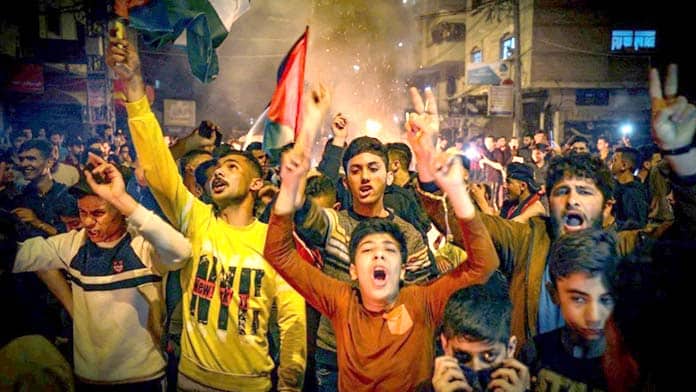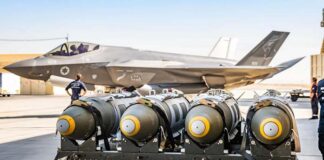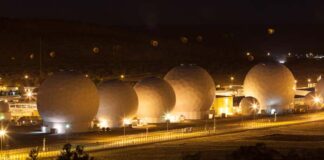Israel’s latest assault has exposed it as a racist, violent state. People who say ‘both sides’ must end violence are really siding with the oppressor, argues Nick Clark
Two recent quotes sum up the regime of violence that Israel forces on Palestinians. The first was a chant by Israelis tearing through Palestinian neighbourhoods—“Death to Arabs.” That’s the murderous hatred towards Palestinians by Israelis who for more than 70 years have driven them from their homes.
The second was a threat by Defence Minister Benny Gantz to resistance groups in Gaza.
“Israel is not preparing for a ceasefire,” Gantz said. “Only when there is complete quiet can we talk about calm.”
That’s the punishment for Palestinians who dare to fight back—bombed into silence. And that’s why it’s obscene to talk of Israel’s “right to defend itself” while calling for “an end to violence on both sides”.
In practice it means denying Palestinians the right to resist, and granting Israel the right to bomb them into submission if they do.
It also means ignoring the source of the violence. As Israel’s history shows, it is founded on racism and violence towards Arabs designed to keep them in a ghettoised minority. Its role as the US’s enforcer in the Middle East has made it a highly militarised society.
For Palestinians, violence is a fact of life. Inside Israel’s borders they face discrimination, poverty and harassment by Israeli citizens and police.
In the Gaza Strip, there are young Palestinian adults who have grown up under siege. In the 14 years since Israel first imposed its blockade, it has pounded Gaza with countless airstrikes and waged three devastating wars. The latest assault looks set to become the fourth.
And in east Jerusalem and the West Bank, Palestinians live under a repressive Israeli military regime. Soldiers restrict their movement with checkpoints, raid their houses, and protect the settlers who attack them.
Palestinian academic and activist Mark Muhannad Ayyash described growing up under the constant threat of violence in an article for Al Jazeera:
“We would regularly be confronted with armed Israeli civilians walking around with their guns out in the open, asserting their supremacy, reminding us that we ought not to look at them the wrong way or else,” he wrote.
“Conversations between us children would turn to stories we heard about torture methods that the Israelis use, the beating a friend or relative took at the hands of Israeli soldiers, an armed Israeli civilian cursing and spitting on a Palestinian, the long imprisonment and suffering of relatives and friends.
“Certainly things seem worse today than they were in those days. Nevertheless, those days and stories pile up one on top of the other, along with experiences of violent acts and events, building and instilling in Palestinians a state of fear.”
Throughout their history, many Palestinians have decided that, rather than living in a state of fear, they’re going to resist. Whenever—and however—they do resist, they’re met with brutal and often lethal repression that makes violence not only justified, but necessary. When Palestinians are shot down for protesting, as thousands were in Gaza during mass protests in 2018, it is hypocrisy to demand they be peaceful.
Israel is not “defending itself” when it bombs Gaza or shoots down protesters—it is enforcing a system of violent oppression. When Palestinians fight back, they are challenging that oppression.
They have the right to do so—with rocks or with rockets.
Palestinian resistance has taken different forms throughout its history.
There have been mass protests, uprisings and strikes. And there have also been heroic campaigns of armed struggle aimed at inflicting defeats on Israel’s military.
There is an important difference between the two—but it’s not whether resistance is violent or non-violent. And often the different struggles are linked.
For instance, when Palestinian resistance groups in Gaza began launching rockets this month, they said it was in defence of protesters in Jerusalem.
Yet it wasn’t the rockets that terrified the Israeli state. It was the fact that the protests in Jerusalem threatened to spread across Palestine, including inside Israel’s borders.
Battle
On the same day that Gantz threatened, “Gaza will burn” he also warned, “Our internal divisions are what threaten us. We must not win the battle in Gaza and lose the battle at home.”
For decades Palestinians in Israel have been brutalised by an Israeli police force that considers them an enemy within.
But now Palestinian protesters have them rattled. Israel’s politicians and generals know that protests can become uprisings that spread—and take years to put down.
They are much more confident that they can contain armed struggle. That’s not just because Israel’s military is more powerful by far than the resistance groups it faces.
In fact, armed resistance has inflicted defeats on Israel in the past. In 2006, Israel invaded Lebanon claiming it would crush the armed Lebanese movement Hizbollah. Weeks later, Hizbollah’s fighters forced Israel to retreat.
And in 2014, Israel ended its all-out war in Gaza—which killed 2251 Palestinians—after seven weeks without inflicting a decisive defeat on Hamas.
Yet armed struggle has never come close to ending the occupation or Israel’s apartheid regime.
Resistance groups use armed struggle as a tactic to force Israel, and the US and its other Middle East allies, into negotiations and concessions.
They want to force the US and Israel to accommodate them as leaders of a Palestinian state. This leads them to make concessions of their own. In the 1970s, the Palestine Liberation Organisation (PLO) waged armed struggle against the occupation.
They relied on the support of Arab states in the region, which they hoped could be drawn into war on their behalf. The problem was that many of those rulers had ties with the US and Britain, which dominated the Middle East.
So the PLO was careful not to challenge them. Arab rulers sometimes found the PLO useful—but also turned against it. In Jordan, where the PLO grew so powerful it became a rival power to the state, the regime carried out a massacre of Palestinians.
More and more, the PLO began looking for ways to be accepted as legitimate negotiating partners with Israel.
One consequence of this was that they abandoned the goal of reclaiming all Palestinian land. Instead, they accepted the promise of a “mini-state” alongside Israel.
In 1993, the PLO renounced armed struggle in favour of a “peace process” that promised them that state. In reality, the deal it led to left them under the thumb of Israel.
Hamas and other Islamist groups emerged as an alternative to the PLO in the wake of the deal. But they follow the same strategy.
Hamas also looked to the support of other Middle Eastern regimes such as Iran. Years of siege in the Gaza Strip has pushed Hamas into deals with the Western-backed Egyptian regime.
The regime helps to enforce the siege of Gaza. But every time Hamas fights back, it also looks to Egypt to intervene and “mediate” on its behalf.
Despite what Israel claims, Hamas has also suggested it’s prepared to make concessions in return for control of a Palestinian mini-state.
Uprisings across Middle East
The most significant challenge Israel has ever faced didn’t come from armed resistance groups. It came when ordinary people rose up across Palestine—the First Intifada.
It was sparked in 1987 by a shocking act of brutality. Hundreds of Palestinians were returning home from a day’s work in Israel when they witnessed a gruesome killing.
An Israeli tank transporter drove at a line of workers’ cars at a checkpoint—crushing four Palestinians to death.
Funerals for three of the men that night turned into a 10,000-strong demonstration. Israeli soldiers tried to crush every protest with lethal violence. But with each killing came more funerals and more demonstrations until the whole of Gaza—and then the whole of Palestine—was in revolt.
Activists’ committees rooted in every neighbourhood, town and village coordinated the rebellion. The most brutal repression by the Israeli state couldn’t crush it.
For five years, Israel was bogged down in an uneven war it seemingly couldn’t win. In January 1988 the Israeli newspaper the Jerusalem Post wrote, “The streets in Gaza, the West Bank and in East Jerusalem are in effective control of the youth. It is a case of our 20-year-olds battling their 20-year-olds. Ours using armour, helicopters and guns, theirs, clubs, rocks and primitive Molotov cocktails.”
Such images of Palestinians standing up to the might of Israel’s military with little more than rocks and petrol bombs exposed the reality of the occupation. Support for the Palestinians grew—crucially across the Middle East.
Arab rulers declared support for the intifada. But they suppressed solidarity demonstrations, fearing that they could turn into revolts of their own.
In Algeria, a mass movement against the government took inspiration from the intifada. Opposition leaders told protesters to “unite and take measures into your own hands like the Palestinians”.
The solidarity movement in Egypt quickly turned its fire on its own government’s close relationship with Israel and the US.
The biggest fear of the US-backed regimes in the Middle East was that the revolt could spill out of Palestine. This eventually pushed Israel into signing the 1993 peace deal with the PLO that aimed to curb the resistance.
Yet Israel and the Arab regimes remain terrified that Palestinian resistance could inspire wider revolts.
In other Arab countries supporters of Palestine can see how the struggle is linked to the fight against their own dictators. That’s why during the 2011 Egyptian Revolution, people stormed the Israeli embassy in Cairo and forced the new regime to open its border with Gaza.
And it’s why the Arab regimes that recently signed deals with Israel are now demanding it halts its assault on the Palestinian resistance—because they fear where it might lead.






